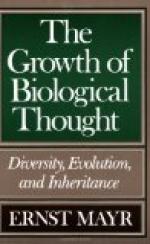The Growth of Thought, As Affecting the Progress of Society.
Part I.
Introductory.
The meditation on human life—on the contrast between what is, and what might be, on supposing a general concurrence to make the best of things-yields emotions both painful and pleasing;—painful for the demonstrations every where presented, of a love of darkness, rather than light; pleasing, that the worst evils are seen to be so remediable; and so clear the proofs of a gradual, but sure progress towards the remedy.
The writer is not very familiar with those authors, who have so much to say on the problem of life—the question, What is life? He supposes them to follow a train of thought, something like this: The life of a creature is that perfection and flourish of its faculties, of which its constitution is capable, and which some of the race are destined to reach. Thus, the life of the lion is realized, when the animal ranges undisputed lord of the sunny desert; finds sufficiency of prey for himself and offspring, which he raises to inherit dominion; lives the number of years he is capable of enjoying existence, and then closes it, without excessive pains, lingering regrets, or fearful anticipations.
Life differs from happiness. It is supposable, that the lion, tamed and petted, trained to feed somewhat after man’s chosen manner, may be as happy as if at liberty in his native range. But such happiness is not the animal’s life; since this implies the kind of happiness proper to the creature’s constitution, in distinction from that induced by forced habits.
To happiness add knowledge and intellectual culture, and all together do not realize the idea of life. The tame lion may be taught many arts, assimilating him to the intelligence of man; but these remove him so much further from his appropriate life. Thus there may be a cultivated intelligence, which constitutes no part of the creature’s life; and this without considering the same as a moral agent.




